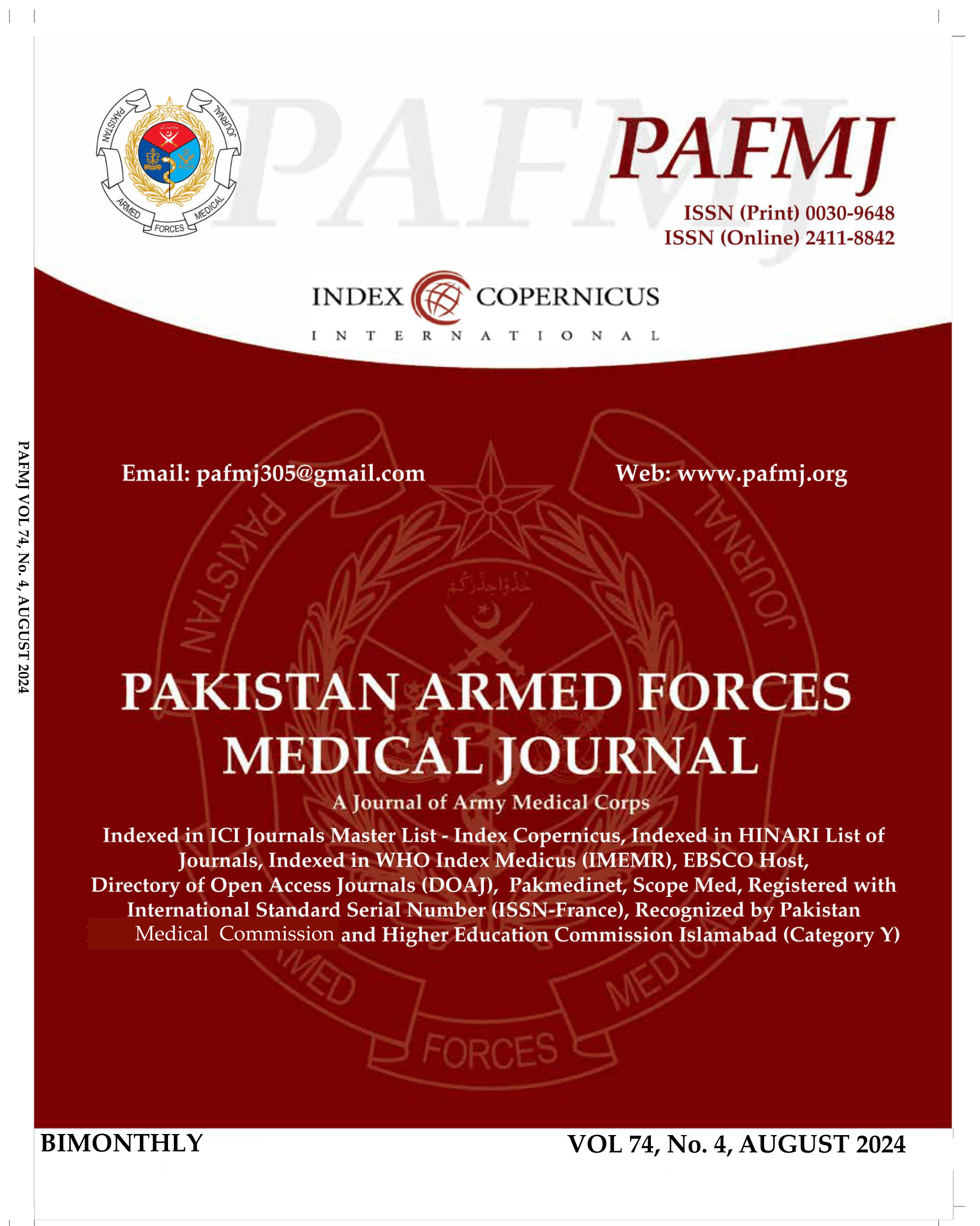Role of Postoperative Antibiotics in Laparoscopic Cholecystectomy after Bile and Stone Spillag
DOI:
https://doi.org/10.51253/pafmj.v74i4.9555Keywords:
Antibiotics, Bile, Laparoscopic cholecystectomyAbstract
Objective: To determine the role of postoperative antibiotics in patients who had bile and stone spillage during laparoscopic cholecystectomy in terms of rate of postoperative surgical site infection and readmission.
Study Design: Quasi experimental study.
Place and Duration of Study: Surgical Department of Pak Emirates Military Hospital, Rawalpindi Pakistan, from Apr to Sep 2022.
Methodology: A total of 166 patients fulfilling the selection criteria were enrolled after taking written informed consent and were divided into two groups i.e. 83 each by odd and even number. Patients in Group-A received postoperative antibiotics and in Group-B did not have antibiotics and the outcome measures were assessed while the patients remained admitted and then weekly until day 30th.
Results: The mean age in the Groups A versus B was 41.27±7.05 versus 41.31±6.14 years and mean duration of hospital stay was 2.48±0.95 versus 2.59±0.81 days, respectively. In Group-A versus B, postoperative infections were present in 2(2.4%) versus 3(3.6%) (p=0.650), surgical site infection in 14(16.9%) versus 11(13.3%) (p=0.515) and readmission occurred in 8(10%) versus 6(7.2%) patients (p=0.576), respectively.
Conclusion: The rate of surgical site infections, rate of readmission and DOH stay was not significantly different between patients who received postoperative antibiotics compared to those who did not after laparoscopic cholecystectomy.
Downloads
References
Colling KP, Besshoff KE, Forrester JD, Kendrick D, Mercier P, Huston JM. Surgical Infection Society Guidelines for Antibiotic Use in Patients Undergoing Cholecystectomy for Gallbladder Disease. Surg Infect 2022; 23(4): 339-350.
https://doi.org/10.1089/sur.2021.207
Nagata K, Fujikawa T, Oka S, Osaki T. A Case of Intractable Lung Abscess Following Dropped Gallstone-Induced Subphrenic Abscess: A Rare Postoperative Complication Caused by Dropped Gallstone During Laparoscopic Cholecystectomy. Cureus 2022; 14(7): e27491.
https://doi.org/10.7759/cureus.27491
Barrat C, Champault A, Matthyssens L, Champault G. Iatrogenic perforation of the gallbladder during laparoscopic cholecystectomy does not influence the prognosis:Prospective study. Ann Chirurgie 2004; 129(1): 25-29.
https://doi.org/10.1016/j.anchir.2003.11.011
Karabulut Z, Güler Y, Doğan P, Şengül S, Çaliş H. What should be done for perforation of the gallbladder during laparoscopic cholecystectomy: Prophylaxis or treatment? J Laparoendosc Adv Surg Tech 2021; 31(1): 54-60.
https://doi.org/10.1089/lap.2020.0322
Porwal R, Soni A, Singh A, Somani SK, Sagar P. Bile spillage and bacterobilia as risk factors for surgical site infection after laparoscopic cholecystectomy: a prospective study at tertiary care hospital. Int Surg J 2019; 6(9): 3223-3228.
https://doi.org/10.18203/2349-2902.isj20194055
Al-Naser MK. Port Site Infections after laparoscopic cholecystectomy. Int J Med Res Health Sci 2017; 6(6): 132-137.
Alam MR, Nuruzzaman M, Begum M, Alim MA, Rahman MM, Karim MR, et al. The frequency of port-site infection in laparoscopic cholecystectomies. Med Today 2021; 33(1): 22-26. https://doi.org/10.3329/medtoday.v33i1.52153
Spaziani E, Di Filippo A, Orelli S, Fiorini F, Spaziani M, Tintisona O, et al. Pre-operative skin antisepsis with chlorhexidine
gluconate and povidone-iodine to prevent port-site infection in laparoscopic cholecystectomy: a prospective study. Surg Infect 2018; 19(3): 334-338.
https://doi.org/10.1089/sur.2017.269
Guruvaiah N, Ponnatapura J. Bronchobiliary fistula: a rare postoperative complication of spilled gallstones from laparoscopic cholecystectomy. Bri Med J 2021; 14(7): e243198.
https://doi.org/10.1136/bcr-2021-243198
Al-Hayali, RA. Long-Term Consequences of Intraoperative Spillage of Bile and Gallstones During Laparoscopic Cholecystectomy. Ind J For Med Toxicol 2022; 16(1): 1064-1073.
https://doi.org/10.37506/ijfmt.v16i1.17636
van Dijk AH, van der Hoek M, Rutgers M, van Duijvendijk P, Donkervoort SC, de Reuver PR, et al. Efficacy of antibiotic agents after spill of bile and gallstones during laparoscopic cholecystectomy. Surg Infect 2019; 20(4): 298-304.
https://doi.org/10.1089/sur.2018.195
Hajong R, Dhal MR, Newme K, Moirangthem T, Boruah MP. A cross sectional study of risk factors for surgical site infections after laparoscopic and open cholecystectomy in a tertiary care hospital in North East India. J Family Med Prim Care 2021; 10(1): 339-342. https://doi.org/10.4103/jfmpc.jfmpc_1245_20
Pai V, Aboosalih S, Sundaram SS, Abraham AR, Prabhu KM. Is there a need for antibiotic cover in clean surgery like laparoscopic cholecystectomy: a prospective study. Int Surg J 2020; 7(3): 797-801.
https://doi.org/10.18203/2349-2902.isj20200825
Kadhim AM, Altaraikhim MH. Short Term Effect of Spilled Bile & Gallstone During Laproscopic Cholecystectomy on Clinical Outcome. Ind J Public Health 2019; 10(6): 499-503.
https://doi.org/10.5958/0976-5506.2019.01323.8
Strasberg SM, Hertl M, Soper NJ. An analysis of the problem of biliary injury during laparoscopic cholecystectomy. J Am Coll Surg 1995; 180: 101–125.
Zehetner J, Shamiyeh A, Wayand W. Lost gallstones in laparoscopic cholecystectomy: All possible complications. Am J Surg 2007; 193: 73–78.
https://doi.org/10.1016/j.amjsurg.2006.05.015
Thapa SB, Kher YR, Tambay YG. Single dose Intraoperative Antibiotics versus Postoperative Antibiotics for Patient Undergoing Laparoscopic Cholecystectomy for Symptomatic Cholelithiasis. J Lumbini Med Coll 2017; 5(1): 13-17.
https://doi.org/10.22502/jlmc.v5i1.112
Hajibandeh S, Popova P, Rehman S. Extended postoperative antibiotics versus no postoperative antibiotics in patients undergoing emergency cholecystectomy for acute calculous cholecystitis: a systematic review and meta-analysis. Surg Innov 2019; 26(4): 485-496.
https://doi.org/10.1177/1553350619835347
Regimbeau JM, Fuks D, Pautrat K, Mauvais F, Haccart V, Msika S, et al. Effect of postoperative antibiotic administration on postoperative infection following cholecystectomy for acute calculous cholecystitis: a randomized clinical trial. J Am Med Assoc 2014; 312(2): 145-154.
Downloads
Published
Issue
Section
License
Copyright (c) 2024 Ubaid Ullah Siddiqi, Muhammad Yousaf Shah, Farukh Gulzar Khawaja, Sohail Ilyas, Ammad Uddin Nasir, Adnan Ali

This work is licensed under a Creative Commons Attribution-NonCommercial 4.0 International License.















